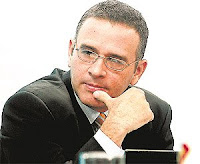It's official -- Mauricio Funes is FMLN candidate for president

In a surprise announcement on Thursday, September 27, the leadership of the FMLN announced that its candidate for president of El Salvador in 2009 would be journalist Mauricio Funes . Joining Funes on the FMLN ticket will be Salvador Sanchez-Ceren, the ex-Coordinator General of the FMLN, and part of the hard line, orthodox leadership of the left wing party. Funes' fame in El Salvador comes as an interviewer of public and political figures on television news shows aired in El Salvador. Learn more about his career in this article on the Global Journalist web site . In February 2005, his firing from Channel 12 caused an outcry throughout the country. (For a contrary view on the Channel 12 incident, read this opinion piece by Paolo Luers in El Faro (in Spanish)). It's still 17 months before the presidential election in March 2009. The question for the FMLN is whether having Funes at the head of the ticket will attract enough voters from the center, outside of the party...
